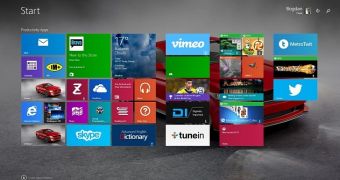They say that Windows 8 is quite a flop for Microsoft, even though some of those who decided to give it a shot were actually very satisfied with the way the operating system is working and looking.
There’s no doubt that Windows 8 is a very controversial OS version, and although some might accuse media of writing biased articles, here are some stats that do nothing more than to confirm that Microsoft’s modern platform isn’t going exactly as expected.
First reported by The Inquirer, statistics provided by Net Applications for June put Windows 8 at 5.93 percent, down 0.36 percent from the month before. Overall, the modern Windows has a combined share of 12.54 percent, which actually represents a decline of 0.1 percentage points from the previous month.
As you can see, whatever the reasons, which could also include people moving to Windows 8.1, Windows 8 lost ground last month, a thing that didn’t actually happen to all Windows versions currently on the market.
For example, Windows 2000, which was launched on February 17, 2000, but RTMd in December 1999, actually increased its share last month from 0.01 percent to 0.03 percent. That’s not quite a breathtaking increase, but it’s the confirmation that while modern platforms are losing points, older ones are still considered a viable solution.
Microsoft itself seems to be trying to get over Windows 8 with some recently-disclosed plans, planning to bring Windows 9 to the market as soon as possible and upgrade the majority of users to this new OS version.
Basically, Microsoft is said to be done with Windows 8, so it’s going in full speed towards Windows 9, the operating system that shall fix all issues with the modern platform and make it a bit more appealing for users across the world.
The company has also prepared a complete strategy plan to lure users into Windows 9, willing to offer the new operating system free for Windows 7 Service Pack 1 and Windows 8.1 Update users. Such a move would most likely be supposed to push users beyond Windows 8, despite the fact that Redmond has poured millions into making it more successful.
Of course, Windows 9 is also expected to be delivered with quite a lot of improvements, including a modern version of the Start menu, which was removed in Windows 8 and replaced with a touch-optimized Start screen, which more or less contributed to its decline as well.

 14 DAY TRIAL //
14 DAY TRIAL //